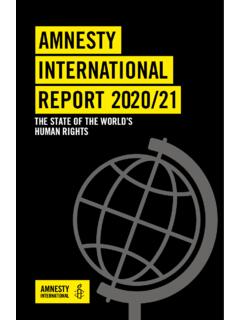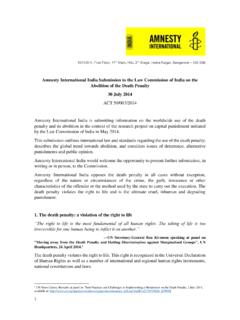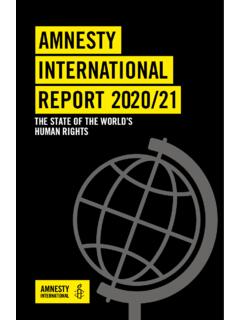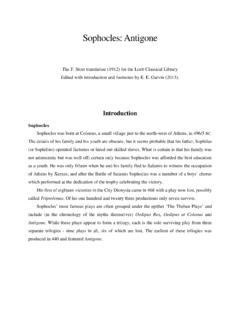Transcription of The Death Penalty V. Human Rights: Why Abolish the Death ...
1 AI Index: ACT 51/002/2007 Amnesty International THE Death Penalty V. Human RIGHTS Why Abolish the Death Penalty ? 1 September 2007 The time has come to Abolish the Death Penalty worldwide. The case for abolition becomes more compelling with each passing year. Everywhere experience shows that executions brutalize those involved in the process. Nowhere has it been shown that the Death Penalty has any special power to reduce crime or political violence. In country after country, it is used disproportionately against the poor or against racial or ethnic minorities. It is also used as a tool of political repression. It is imposed and inflicted arbitrary. It is an irrevocable punishment, resulting inevitably in the execution of people innocent of any crime. It is a violation of fundamental Human rights. Over the past decade an average of at least three countries a year have abolished the Death Penalty , affirming respect for Human life and Yet too many governments still believe that they can solve urgent social or political problems by executing a few or even hundreds of their prisoners.
2 Too many citizens in too many countries are still unaware that the Death Penalty offers society not further protection but further brutalization. Abolition is gaining ground, but not fast enough. The Death Penalty , carried out in the name of the nation s entire population, involves everyone. Everyone should be aware of what the Death Penalty is, how it is used, how it affects them, how it violates fundamental rights. The Death Penalty is the premeditated and cold-blooded killing of a Human being by the state. The state can exercise no greater power over a person than that of deliberately depriving him or her of life. At the heart of the case for abolition, therefore, is the question of whether the state has the right to do so. 1 Updated first chapter from Amnesty International, When the State Death Penalty v.
3 Human rights, AI Index: ACT 51/07/89, 1989, UK 2 Countries that have abolished the Death Penalty for all crimes in the last 10 years are Albania, Armenia, Azerbaijan, Bhutan, Bosnia-Herzegovina, Bulgaria, Canada, C te d Ivoire, Cyprus, East Timor, Estonia, Georgia, Greece, Liberia, Lithuania, Malta, Mexico, Montenegro, Nepal, Poland, Philippines, Rwanda, Samoa, Senegal, Serbia, South Africa, Turkey, Turkmenistan, Ukraine, United Kingdom. Chile, Bolivia, Latvia and Kyrgyzstan abolished the Death Penalty for ordinary crimes. 2 Amnesty International AI Index: ACT 51/002/2007 When the world s nations came together six decades ago to found the United Nations (UN), few reminders were needed of what could happen when a state believed that there was no limit to what it might do to a Human being. The staggering extent of state brutality and terror during World War II and the consequences for people throughout the world were still unfolding in December 1948, when the UN General Assembly adopted without dissent the Universal Declaration of Human Rights.
4 The Universal Declaration is a pledge among nations to promote fundamental rights as the foundation of freedom, justice and peace. The rights it proclaims are inherent in every Human being. They are not privileges that may be granted by governments for good behaviour and they may not be withdrawn for bad behaviour. Fundamental Human rights limit what a state may do to a man, woman or child. No matter what reason a government gives for executing prisoners and what method of execution is used, the Death Penalty cannot be separated from the issue of Human rights. The movement for abolition cannot be separated from the movement for Human rights. The Universal Declaration recognizes each person s right to life and categorically states further that No one shall be subjected to torture or to cruel, inhuman or degrading treatment or punishment.
5 In Amnesty International s view the Death Penalty violates these rights. Self-defence may be held to justify, in some cases, the taking of life by state officials: for example, when a country is locked in warfare (international or civil) or when law-enforcement officials must act immediately to save their own lives or those of others. Even in such situations the use of lethal force is surrounded by internationally accepted legal safeguards to inhibit abuse. This use of force is aimed at countering the immediate damage resulting from force used by others. The Death Penalty , however, is not an act of self-defence against an immediate threat to life. It is the premeditated killing of a prisoner who could be dealt with equally well by less harsh means. There can never be a justification for torture or for cruel, inhumane or degrading treatment or punishment. The cruelty of the Death Penalty is evident.
6 Like torture, an execution constitutes an extreme physical and mental assault on a person already rendered helpless by government authorities. 3 Amnesty International AI Index: ACT 51/002/2007 If hanging a woman by her arms until she experiences excruciating pain is rightly condemned as torture, how does one describe hanging her by the neck until she is dead? If administering 100 volts of electricity to the most sensitive parts of a man s body evokes disgust, what is the appropriate reaction to the administration of 2,000 volts to his body in order to kill him? If a pistol held to the head or a chemical substance injected to cause protracted suffering are clearly instruments of torture, how should they be identified when used to kill by shooting or lethal injection? Does the use of legal process in these cruelties make their inhumanity justifiable?
7 The physical pain caused by the action of killing a Human being cannot be quantified. Nor can the psychological suffering caused by fore-knowledge of Death at the hands of the state. Whether a Death sentence is carried out six minutes after a summary trial, six weeks after a mass trial or 16 years after lengthy legal proceedings, the person executed is subjected to uniquely cruel, inhuman and degrading treatment and punishment. Internationally agreed laws and standards stipulate that the Death Penalty can only be used after a fair judicial process. When a state convicts prisoners without affording them a fair trial, it denies the right to due process and equality before the law. The irrevocable punishment of Death removes not only the victim s right to seek redress for wrongful conviction, but also the judicial system s capacity to correct its errors.
8 Like killings which take place outside the law, the Death Penalty denies the value of Human life. By violating the right to life, it removes the foundation for realization of all rights enshrined in the Universal Declaration of Human Rights. As the Human Rights Committee set up under the International covenant on Civil and Political Rights has recognized, The right to the supreme right from which no derogation is permitted even in time of public emergency which threatens the life of the In a general comment on Article 6 of the covenant issued in 1982, the Committee concluded that all measures of abolition [of the Death Penalty ] should be considered as progress in the enjoyment of the right to life within the meaning of Article 40 . Many governments have recognized that the Death Penalty cannot be reconciled with respect for Human rights. The UN has declared itself in favour abolition.
9 Two-thirds of the countries in the world have now abolished the Death Penalty in law or practice. 4 Amnesty International AI Index: ACT 51/002/2007 Amnesty International's latest information shows that3: 90 countries and territories have abolished the Death Penalty for all crimes; 11 countries have abolished the Death Penalty for all but exceptional crimes such as wartime crimes; 30 countries can be considered abolitionist in practice: they retain the Death Penalty in law but have not carried out any executions for the past 10 years or more and are believed to have a policy or established practice of not carrying out executions, a total of 131 countries have abolished the Death Penalty in law or practice, 66 other countries and territories retain and use the Death Penalty , but the number of countries which actually execute prisoners in any one year is much smaller. Amnesty International statistics also show a significant overall decline in the number of reported executions in 2006.
10 In 2006, 91% of all known executions took place in a small number of countries: China, Iran, Iraq, Pakistan, Sudan and the USA. Europe is almost a Death Penalty -free-zone the main exception being Belarus; in Africa only six states carried out executions in 2006; in the Americas only the USA has carried out executions since 2003. Unlike torture, disappearances and extrajudicial executions, most judicial executions are not carried out in secret or denied by government authorities. Executions are often announced in advance. In some countries they are carried out in public or before a group of invited observers. No government publicly admits to torture or other grave violations of Human rights, although privately some officials may seek to justify such abuses in the name of the greater good . But retentionist governments, those that keep the Death Penalty , for the most part openly admit to using it: they do not so much deny its cruelty as attempt to justify its use; and the arguments they use publicly to justify the Death Penalty resemble those that are used in private to justify other, secret abuses.
















